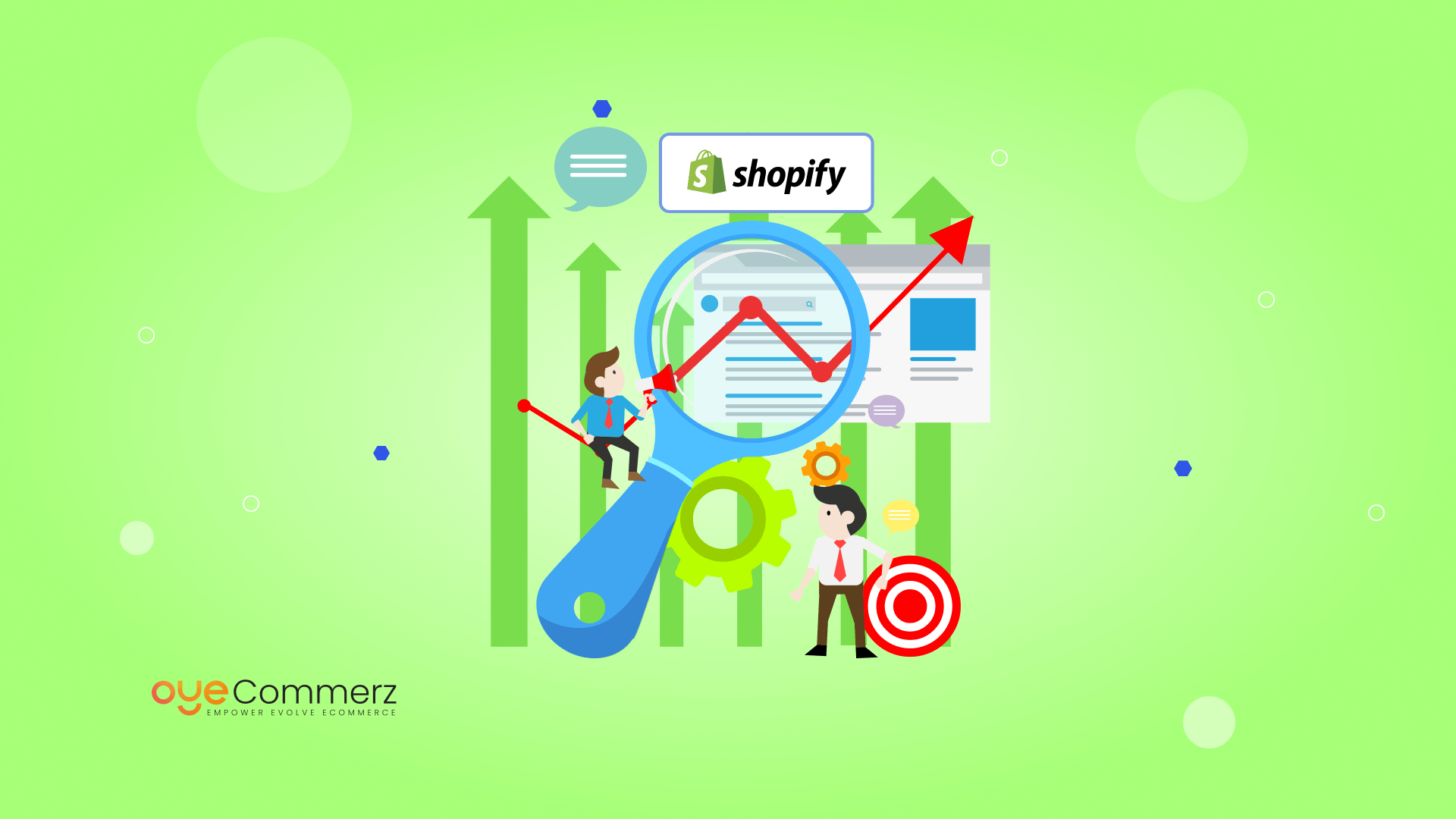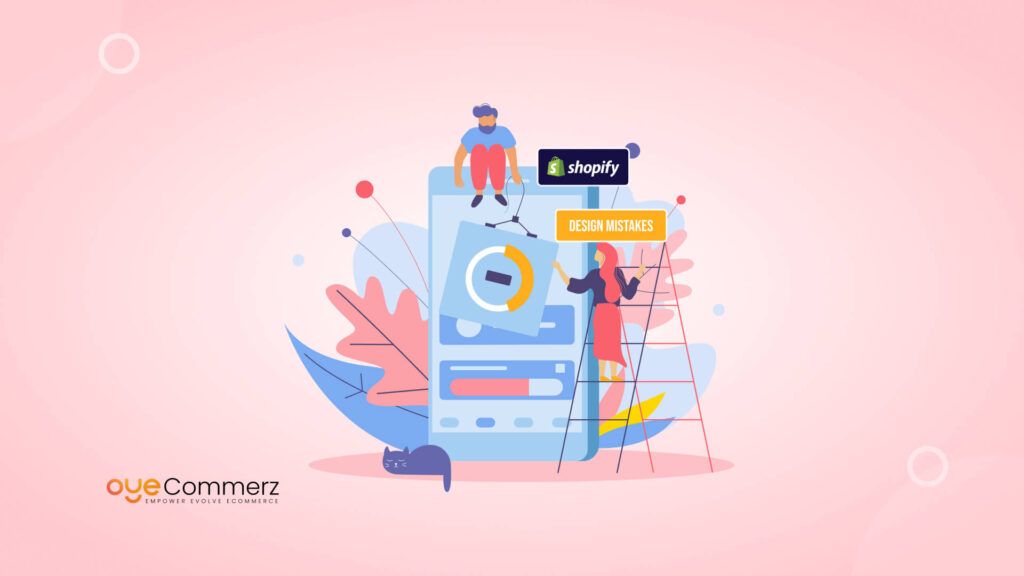In the competitive world of enterprise e-commerce, achieving top search rankings is crucial for driving visibility and growth. For enterprise-level clients, the stakes are higher, and so are the challenges when it comes to Shopify SEO. As businesses expand and their SEO needs evolve, they must adopt advanced strategies to enhance their performance and stay ahead of their competitors.
In this blog, we’ll explore sophisticated Shopify Search ranking marketing tactics tailored specifically for large-scale enterprises. We’ll delve into the unique challenges these businesses face and provide a detailed, step-by-step guide to mastering advanced SEO techniques. With these insights, enterprise clients can navigate the complexities of the digital landscape, boost their search rankings, and ensure long-term success in the ever-evolving online market.
Table of Contents
ToggleExploring Shopify SEO for Enterprise Requirements
Shopify stores for enterprise level are different from the ones that are of smaller size in terms of traffic, structure, and requirements. It should also be noted that these stores invariably operate with huge product catalogues, work with several departments, and possess large amounts of detailed data that can all influence the SEO result. It is important to note all these to be able to utilize knowledge and means of SEO.
- Complexity and Scale: Complex structures of their pages include the product listing pages, category pages, and blog articles which are present in the majority of the enterprise Shopify stores. This factor makes the SEO process more delicate to ensure all the pages are optimized and can meet the set SEO goals.
- Technical SEO Challenges: As businesses grow and organizations involved in the provision of enterprises hold larger operations, technical SEO issues are likely to arise. Some of these might be; Site speed, mobile friendliness, and fundamental integration of structured data.
- Integration with Other Systems: Each enterprise has different computer systems working within an organization, which may include inventory control, CRM, and so on. This is because these systems, when well integrated and connected to Shopify, can affect the SEO of the site; if there is a problem with the data feed or the speed of the site then the SEO of the site will be affected.
Different Techniques Used to Improve Search Engine Rankings
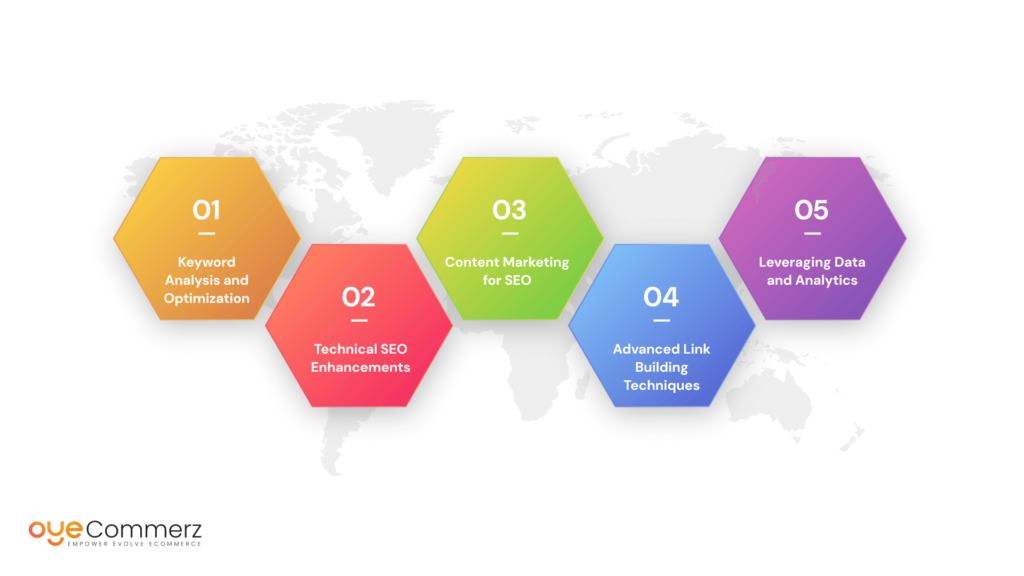
Higher search rankings for enterprise Shopify stores involve an approach that targets many factors. Here are some advanced marketing strategies to consider:
1. Keyword Analysis and Optimization
Finally, keyword research is the cornerstone of any good SEO work, and therefore its proper performance should be considered a priority. For the clients particularly the enterprise clients, this means going to the extent of using not only the most common keywords but rather extended keywords such as the long-tail keywords and those keywords which are specific to a certain market niche.
- Advanced Keyword Tools: Very useful are Ahrefs, SEMrush, and Google Keywords for analyzing the eventual keywords with a high value for the given industry. Determine areas for improvement with keywords and discover gaps in the keyword strategy being employed.
- On-Page Optimization: Primary and secondary keywords should also be incorporated into the titles, meta tags, headers, and in-body text. This holds in terms of the keyword boasting technique of keyword stuffing which is highly discouraged.
2. Technical SEO Enhancements
As a component of digital marketing, technical SEO is incredibly important for any well-functioning Shopify store, especially for enterprises.
- Site Speed Optimization: Having a complex number of products and a lot of visitors will negatively affect your site’s speed. This can be done by analyzing with the help of tools such as Google PageSpeed Insight and GTmetrix in regards to optimization of the site’s loading speed. It is also highly recommended to, for instance, resize images, enable browser caching, and work with a content delivery network CDN. Google PageSpeed Insights reports that a 1-second delay in mobile page load time can reduce conversions by up to 20%.
- Structured Data Markup: Ensure that your copy has a schema markup which enables the Search Engines to understand your content better. This can help to increase the chances of obtaining rich snippets and in turn, making enhancements to visibility in the result pages.
- Mobile Optimization: As more and more users are accessing sites on mobile devices, be doubly sure that your Shopify store is optimized and fits well on mobile.
3. Content Marketing for SEO
Information that meets the set quality and offers the visitors relevance is crucial in enhancing user engagement as well as improving SEO metrics.
- Content Creation: Create a large number of content that will help you cover the needs of your target audience and meet their needs. This may be in the form of detailed blog posts, product guides, case studies, and industry insights among others.
- Content Distribution: Share it through social networks, distribute it in the newsletter, and let people discuss it in the relevant community. Make your audience participate by sharing what you post.
- Content Updates: It is also important to update content that has been previously posted frequently to keep the posts relevant to readers. This can entail such actions as adding new information to the site, altering the old information that needs updating, and improving the keyword optimization for the newly discovered keywords that may be useful.
4. Advanced Link Building Techniques
As is already known, link building is one of the strong foundations of SEO, and for clients at the enterprise level, it is important to implement such strategies.
- Quality Over Quantity: Give priority to getting backlinks from quality sites as it is essential to get links from quality websites. It may comprise trade journals, expert bloggers and blogs, academic databases, and any other reliable sources of information.
- Guest Blogging: They continue providing guest posts for other relevant websites in the industry for backlinking and authority.
- Partnerships and Collaborations: Target other companies, bloggers, and other proponents in your industry for a link exchange to gain increased exposure for your site.
5. Leveraging Data and Analytics
Quantitative information is crucial in the decision-making process and in the assessment of SEO activities.
- Google Analytics: Analyze the data in Google Analytics to see the sources of traffic, users’ activity, their conversion rates, etc. All of this should be used to analyze the obtained data and define trends, strong sides, and weak points.
- SEO Tools: Such services as Google Search Console, Ahrefs, and SEMrush can be used for reviewing your site, analyzing your keyword ranking positions, and checking for any technical problems.
- A/B Testing: Apply A/B on one or multiple features of your site; headlines, buttons, and layouts, to know what your audience will resonate with.
Addressing Common SEO Challenges for Enterprise Clients
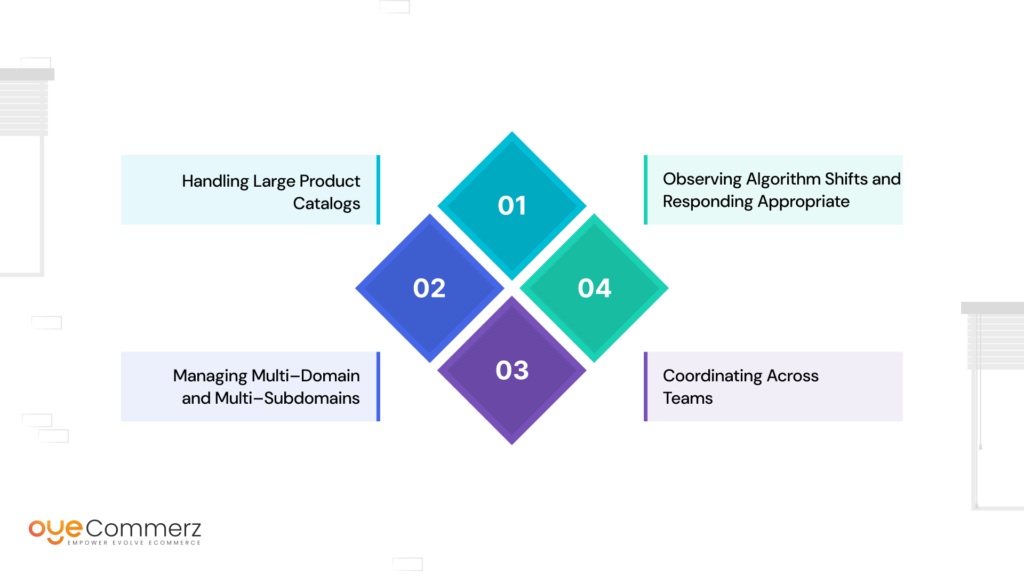
B2B Shopify customers very often face some unique SEO issues that should be addressed individually.
1. Handling Large Product Catalogs
It is always a challenge to handle SEO for a huge number of products. Use internal links to guide the search engine through your site structure and also ensure that they can locate other major pages on the site.
2. Managing Multi–Domain and Multi–Subdomains
Enterprise organizations could have several domains or subdomains in their organization. Ensure that there are continued optimization practices in all domains and use canonical tags for issues to do with duplication.
3. Coordinating Across Teams
Working in a large company where several departments are operating the Shopify store, it’s difficult to maintain cohesion on the proper SEO execution. Create the company’s standard SEO plan and policy so that different teams are on the same page.
4. Observing Algorithm Shifts and Responding Appropriate
One of the primary things that any Webmaster needs to realize is the fact that search engine algorithms are always changing. Keep track of such changes and always ensure that you are optimizing your website to ensure that your ratings on the search engines are merely maintained if not improved.
Future-Proofing Your SEO Strategy: Trends to Watch
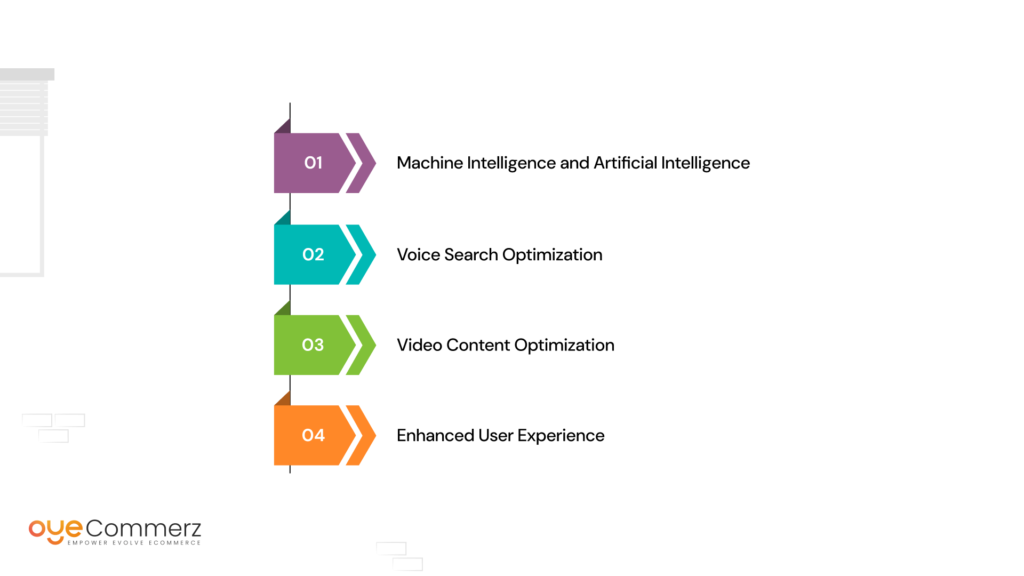
As a result of this, enterprise clients need to be in a position to develop and embrace the emerging trends.
1. Machine Intelligence and Artificial Intelligence
Search algorithms are also seeing the impact of AI or, to be more specific, the impact of machine learning. Write well-researched, meaningful, and engaging material that will satisfy the artificial intelligence algorithms’ parameters.
2. Voice Search Optimization
As you can see voice search grows rapidly, so it’s high time to focus on the content that will be relevant to voice search queries, keyphrases, and conversational matches.
3. Video Content Optimization
Video and media content placement is increasing in search engine marketing. Use videos in your content marketing plan and ensure that you incorporate SEO video titles, descriptions, and tags.
4. Enhanced User Experience
It has also been observed that user experience or UX is still one of the critical ranking factors. Make sure to provide your customers with an outstanding experience aimed at easy shopping through your Shopify store no matter the type of device they use.
Elevate Your Enterprise Shopify Store’s Search Rankings with OyeCommerz!
At OyeCommerz, we specialize in advanced Shopify SEO strategies tailored for large-scale operations. Our expert team offers comprehensive keyword research, technical SEO enhancements, and cutting-edge content marketing techniques to ensure your store stands out in search results. Let the Oyecommerz Seo strategy team help you tackle unique SEO challenges and stay ahead of the competition.
Contact OyeCommerz today to optimize your Shopify store for success and drive higher traffic and conversions. Unlock the full potential of your enterprise with our proven SEO solutions.
Contact to Migrate your Site to Shopify Now
Conclusion
For enterprise clients, Shopify SEO presents a multifaceted challenge, demanding a nuanced approach to achieve and maintain high search rankings. By mastering sophisticated keyword targeting, enhancing technical SEO, leveraging content marketing, and staying abreast of emerging trends, large-scale businesses can significantly improve their visibility and drive sustainable online revenue.
Embracing these advanced strategies in Shopify Google marketing not only helps enterprises stay competitive but also ensures they remain agile in the ever-evolving SEO landscape. With these practices, enterprise-level Shopify stores can secure high organic traffic and thrive in the digital marketplace.

